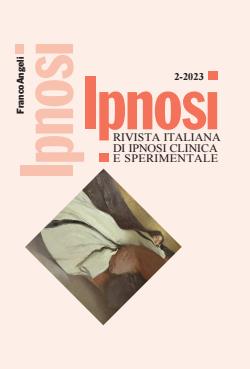Articoli
Presentazione del libro, Fabio Carnevale (a cura di )
Cinema e ipnosi
Review
Riviste e pubblicazioni internazionali
Recensioni

IPNOSI
Rivista italiana di ipnosi clinica e sperimentale
2 fascicoli all'anno, ISSN 1971-0461 , ISSNe 1972-4985
Prezzo fascicolo (inclusi arretrati): € 24,00
Prezzo fascicolo e-book (inclusi arretrati): € 21,00
Canoni 2024
Biblioteche, Enti, Società